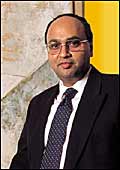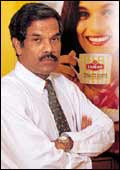|
 In
the days ahead, 10-12 per cent of Hindustan Lever (HLL's) 60-odd
senior managers-right from general managers to category heads-will
find themselves out of Lever House, the headquarters of the Rs 10,138-crore
fast-moving consumer goods giant. No, they won't be sacked, but
most of them-in the words of a senior HLL director-will be "compensated
with regional positions". A few would be redeployed or, to
put it more bluntly, demoted. In
the days ahead, 10-12 per cent of Hindustan Lever (HLL's) 60-odd
senior managers-right from general managers to category heads-will
find themselves out of Lever House, the headquarters of the Rs 10,138-crore
fast-moving consumer goods giant. No, they won't be sacked, but
most of them-in the words of a senior HLL director-will be "compensated
with regional positions". A few would be redeployed or, to
put it more bluntly, demoted.
This isn't some Machiavellian plot being hatched
by the Unilever top brass, but rather a logical extension of the
restructuring announced last fortnight at the $47 billion Anglo-Dutch
major's Indian subsidiary. Come May 1, Chairman Banga will hand
over day-to-day operational management to two "considerably
autonomous" managing directors. Arun Adhikari, currently Executive
Director (Personal Products), will head the home and personal care
business (along with detergents), and S. Ravindranath, Executive
Director (Beverages), will take over the foods portfolio (including
beverages and ice cream). "With two MDs, we will now be a more
empowered and more focused organisation,'' says Banga, with a reminder
that "I will (still) be fully accountable for the Indian operations."
And be based in Mumbai, not in Singapore.
 |
 |
| ARUN ADHIKARI: The MD-designate has been
mandated to infuse Lever's home and personal care segment with
much-needed dynamism |
S. RAVINDRANATH: The former head of beverages
business has been charged with jumpstarting the FMCG giant's
foods business |
Lever's current management committee comprises
13 members, and the operations are divided into five business units
(detergents, personal care, foods, beverages and ice cream). Under
the new structure, there will now be just two divisions (HPC and
foods) headed by the two MDs, each with a five-member management
committee. The newly-cast board will have five members, with a Finance
Director, D. Sundaram and a Vice Chairman, M.K.Sharma, in addition
to the two MDs and the Non-Executive Chairman. As Banga explains,
the benefits of such a structure are that HLL will now be able to
respond more aggressively, and respond faster in the marketplace.
"It couldn't have come at a better time," he adds.
What also couldn't have come at a better time,
at least for Banga, is his elevation as head of the Asia HPC business,
worth $6.1 billion, accounting for a little under 30 per cent of
Unilever's worldwide, and the biggest HPC business for the Anglo-Dutch
behemoth (bigger than Europe and North America). The Chairman swears
that the reorganisation and his elevation are "disconnected",
and insiders at HLL aren't surprised by either. "The reorganisation
is the next phase of the rationalisation that Banga kicked off two
years ago-and which is in line with Unilever's worldwide structure.
As for his elevation, he's obviously played his cards well,"
says a clearly indifferent HLL manager.
Banga isn't the first HLL Chairman to make it
big on the global stage. Predecessor K.B. Dadiseth is today head
of Unilever's worldwide HPC activities, worth all of $22 billion,
and another former director Harish Manwani heads the $4.6 billion
North American HPC portfolio. Banga's new posting is doubtless prestigious
but Banga, like Manwani, reports to Dadiseth. In his own words:
"HLL's revenues today are $2 billion. HPC Asia is $6 billion.
So I have another $4 billion of responsibility." Asia includes
Vietnam and Thailand (where just as in India Unilever enjoys a dominant
position), Indonesia, the second largest Unilever business in Asia
after India, and the fledgling $350 million China operations, a
late starter, but surely with the most potential.
TRICK OR TREAT FOR BANGA?
Is M.S. Banga getting promoted or
kicked upstairs? |
 POINT:
The restructuring at Lever is a reaction to the company's inability
to grow, and the competitive pressures being felt in the market
place. POINT:
The restructuring at Lever is a reaction to the company's inability
to grow, and the competitive pressures being felt in the market
place.
COUNTERPOINT: Not true.
For one, the reorganisation, and Banga's appointment as President
of the Asian HPC business are disconnected events. The reorganisation
is the logical next step in the rationalisation that began a
couple of years ago.
POINT: Is Banga's appointment
at the Asian level really a promotion?
COUNTERPOINT: Yes, yes,
yes! HPC Asia is a $6 billion business, with India accounting
for roughly $2 billion. So in effect, Banga has got a further
$4 billion worth of responsibility.
POINT:
Does Banga deserve a promotion, in the light of Hindustan
Lever's domestic woes?
COUNTERPOINT: Of course.
Since he took over in 2000, he has significantly restructured
the company by divesting 7-8 businesses at a good value. Today
HLL has a lean portfolio focused on FMCG, thanks largely to
Banga. Foods profitability too has improved. If growth hasn't
come, it has more to do with the "counter-forces"
in the marketplace since 2000, during which Banga determinedly
pursued his strategy.
POINT: By making Banga
Non-Executive Chairman, and empowering two managing directors,
Banga's wings have been clipped domestically.
COUNTERPOINT: In the light
of the Chairman's new Asia responsibilities, he will be travelling
a lot. Since Indian regulations don't allow for a part-time
director concept, a non-executive role was imperative to heed
to good governance practices. Although Banga's role won't
be hands-on anymore, he is still fully accountable for the
Indian operations.
POINT:
Banga's elevation is not as impressive as that of some of
his predecessors. K.B. Dadiseth, for instance, is head of
the global HPC business, and a former HLL Director Harish
Manwani is now President of Unilever's North American HPC
business.
COUNTERPOINT: The Asian
HPC business is larger than that of Europe and North America,
and has the most potential for growth.
POINT:
The restructuring is a precursor to splitting the foods and
HPC business.
COUNTERPOINT: "We
have no intention to split the business," says Banga.
In fact, at various levels, like fieldforce, for instance,
there will be integration.
|
Lever's Quest For Growth
The debate doesn't so much surround whether
Banga has been kicked upstairs, but whether he deserves the elevation
against the backdrop of HLL's performance over the past four years.
At least on the surface, Lever's performance has deteriorated since
May 2000. Between 2000 and 2003, HLL's net sales shrunk, and low-cost,
nimble competitors have nibbled at its marketshares in key categories
like soaps, detergents, shampoos and toothpastes. In contrast, in
the four years before Banga took over-when Dadiseth was Chairman-HLL
was growing in double digits-at over 30 per cent. Banga, it would
seem, just couldn't maintain the tempo. So what has he achieved
to deserve such a handsome posting?
Plenty, avers the Banga camp at Lever House.
The biggest achievement, points out one manager, is the "significant
restructuring", during which Banga divested at least eight
low-margin or non-FMCG HLL businesses with revenues totalling close
to Rs 1,000 crore-including oils & fats and animal feeds-all
at handsome values, making HLL a more pure-play FMCG than it was
pre-2000. "Of course, acquisitions are more sexy than divestments,"
quips the manager, with an obvious reference to Dadiseth's acquisition
binge, during which he gobbled up diverse companies right from ice
cream maker Kwality to cosmetics major Lakme.
So whilst inorganic growth did account for
a large part of the growth between 1996 and 2000, the flurry of
acquisitions also resulted in HLL being saddled with an unwieldy
basket of 110 brands. That's where Banga's second major accomplishment
comes into the picture: He consolidated the portfolio into a lean,
sharply-focused range of 35 power FMCG brands.
Such efforts at consolidation have been noted
by the Unilever top brass. But a section of analysts points out
that these initiatives, though noteworthy, aren't enough to hide
the shortcomings of HLL in the Banga years. Other than the company's
inability to grow the topline, there's also the troubled foods business
that hasn't been able to enter the black. The ventures that were
flagged off with fanfare-like e-tailing and confectionery-haven't
yet succeeded in becoming the badly-needed growth engines that Lever
has been striving for.
 Banga
maintains that the new ventures have to go through their "incubation
period," and they will achieve critical mass in the fullness
of time. As for foods, the Chairman explains that plenty of progress
has been made: Operating and gross margins are up, gross profits
have trebled over the past four years, and the company is today
in a position to invest in growth in this business. "Foods
needs nurturing," says Banga, who credits the current Foods
head Gunender Kapur for improving profitability. Whilst Kapur's
new assignment overseas hadn't yet been announced at the time of
writing, Lever insiders are pretty sure it's going to be a ''hot
posting for a hot guy''. ''I will miss him, but there's no dearth
of talent at HLL," smiles Banga. Banga
maintains that the new ventures have to go through their "incubation
period," and they will achieve critical mass in the fullness
of time. As for foods, the Chairman explains that plenty of progress
has been made: Operating and gross margins are up, gross profits
have trebled over the past four years, and the company is today
in a position to invest in growth in this business. "Foods
needs nurturing," says Banga, who credits the current Foods
head Gunender Kapur for improving profitability. Whilst Kapur's
new assignment overseas hadn't yet been announced at the time of
writing, Lever insiders are pretty sure it's going to be a ''hot
posting for a hot guy''. ''I will miss him, but there's no dearth
of talent at HLL," smiles Banga.
It will now be largely up to Adhikari-who effectively
will be responsible for 68 per cent of HLL (the HPC business has
revenues of Rs 6,800 crore) and Ravindranath-who incidentally began
his career in HLL on the non-management side-to marshal that pool
of talent, with Banga providing the strategic leadership and operational
direction. Besides enabling a sharper focus, more aggression, and
faster decision-making, the new structure with Banga as the Asian
HPC head honcho enables Lever to think pan-Asian, much like competitor
Procter & Gamble does. For instance, HLL can look at sourcing
opportunities from the region, thereby reducing costs wherever possible.
The new structure will come into play from
May 1, and the next couple of weeks won't be without their share
of unease, as managers get accustomed to new reporting relationships.
But going by the action at Lever House, you could be forgiven for
believing a new aggressive and nimble Lever is already in place.
At the time of writing, the haircare managers were readying to launch
Clinic Plus with a lower price tag, and a host of similar such initiatives
were in the works. Banga may be on a new high, but back home HLL
still has to battle familiar demons closer to the ground.
|
